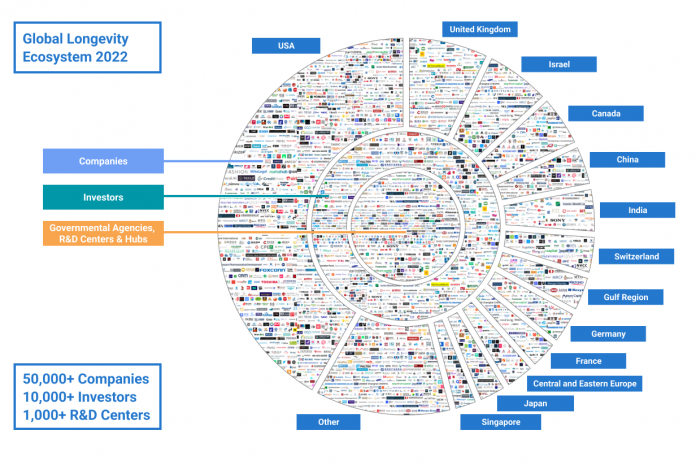
-
The longevity industry is estimated to be worth $26.5 trillion in 2022 and expected to reach $33 trillion in 2026
-
The longevity database encompasses over 50,000 companies, 10,000 investors, 1,000 R&D hubs, across 20 sectors and 160 sub-sectors, containing over 9.5 million data points
The Sharjah Research, Technology, and Innovation Park has recently hosted an interactive session with Deep Knowledge Group, which revealed the world’s largest healthy aging database mapping the entire longevity sector globally. The database encompasses over 50,000 companies, more than 10,000 investors, and over 1,000 R&D hubs, across 20 sectors and 160 sub-sectors, containing over 9.5 million data points.
An emerging industry in the MENA region, longevity is estimated to be worth $26.5 trillion in 2022 and is expected to reach $33 trillion in 2026 globally. Sitting at the intersection of several vital subsectors such as BioTech, pharmaceuticals, FinTech, InsurTech, and many more, longevity is expected to be the largest and most sophisticated industry of all time.
The sector is focused on healthy aging, comprising technologies and software that aim to improve the health and lengthen the lifespan of people. It presents solutions for the prevention, detection, monitoring, and treatment of chronic diseases.
Commenting on this tech talk as part of a Ramadan majlis series the Park is hosting, His Excellency Hussain Al Mahmoudi, Chief Executive Officer of Sharjah Research Technology & Innovation Park, said: “Healthy longevity plays a role in increasing life expectancy, extending the elderly’s productivity and improving their health and wealth. This is at the heart of our efforts as an organization and as a nation. Longevity is affected by many factors such as economic growth, government healthcare policies, the quality of healthcare providers, and the extent to which senior citizens have access to all of that.”
Speaking at the event, which was attended by professionals, entrepreneurs, and investors, Anastasia Lit, Director of Investor Relations, Deep Knowledge Group shared her insights into the sector and the investment opportunities it offers, saying: “While aging poses one of the biggest problems of our time, it presents one of the most promising opportunities. Financial institutions, such as investment banks, pension funds, and insurance companies can either sink or swim when hit by an increasingly aging population. Whether they will succeed in riding the wave or end up drowning will depend not only on their willingness to deploy new business models adapted to an aging population but also on the quality of longevity analytics that can be used to develop such business models.”
Speaking about the timeliness of the longevity topic and how it affects all of us as individuals, businesses, and governments, Baha Hamadi, VP of Communications, Deep Knowledge Group, said: “Healthy aging is the need of the hour. Living longer and wealthier is beyond adopting a healthy, active lifestyle. Even though the longevity industry has witnessed unprecedented levels of growth and maturity over the past decade, the term longevity remains unclear among many people, including investors who often associate longevity with anti-aging skin creams, fitness, and wellness. The sector entails much more than that. Longevity is the deepest of all DeepTech sectors, sitting at the intersection of many frontier technologies including advanced biomedicine.”
In 2006, the World Health Organization developed the concept of Age-Friendly Cities—key destinations for people who seek to live comfortably during their twilight years. While Age-Friendly Cities can be viewed as good places to retire, ‘Longevity Valleys’ will emerge as ideal locations where senior citizens can remain professionally, mentally, socially, and economically active, for as long as possible.




































